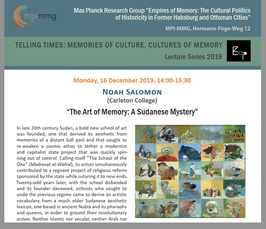"The Art of Memory: A Sudanese Mystery"
Telling Times: Memories of Culture, Cultures of Memory - Lecture Series 2019
- Date: Dec 16, 2019
- Time: 02:00 PM - 03:30 PM (Local Time Germany)
- Speaker: Noah Salomon (Carleton College)
- Noah Salomon is Associate Professor of Religion at Carleton College. His first book, For Love of the Prophet: An Ethnography of Sudan’s Islamic State (Princeton University Press, 2016) examines the inner-workings of an Islamic political project and its refractions as it sought to reform state and society, and was in turn reformed by them. It won the 2017 Albert Hourani Prize from the Middle East Studies Association and a 2017 Excellence in the Study of Religion Award from the American Academy of Religion. A recent recipient of a Mellon New Directions Fellowship, Salomon is currently based in Beirut, Lebanon, working on a transregional project on the ethics of Islamic unity in the context of popular revolution and in its aftermath.
- Location: MPI-MMG, Hermann-Föge-Weg 12, Göttingen
- Room: Conference Room

For more details please contact cziesielsky(at)mmg.mpg.de.
In late 20th century Sudan, a bold new school of art was founded, one that derived its aesthetic from memories of a distant Sufi past and that sought to re-awaken a cosmic ethos to tether a modernist and capitalist state project that was quickly spinning out of control. Calling itself “The School of the One” (Madrasat al-Wahid), its artists simultaneously contributed to a regnant project of religious reform sponsored by the state while suturing it to new ends. Twenty-odd years later, with the school disbanded and its founder deceased, activists who sought to undo the previous regime came to derive an artistic vocabulary from a much older Sudanese aesthetic lexicon, one based in ancient Nubia and its pharaohs and queens, in order to ground their revolutionary action. Neither Islamic nor secular, neither Arab nor precisely African, the conflicting categories around which Sudanese politics has been constructed in recent memory, Nubia provided these activists with a uniquely Sudanese symbol that might catapult them beyond the problem of identity that had besieged the country since independence. Taking as a jumping-off point a mystery that the author came to untangle about a painting by the founder of the School of the One, this talk discusses the larger puzzle of the precise relationship between art and memory, exploring Sudan’s complicated relationship with its pasts, as multiple temporalities jostle with one another to determine its future.